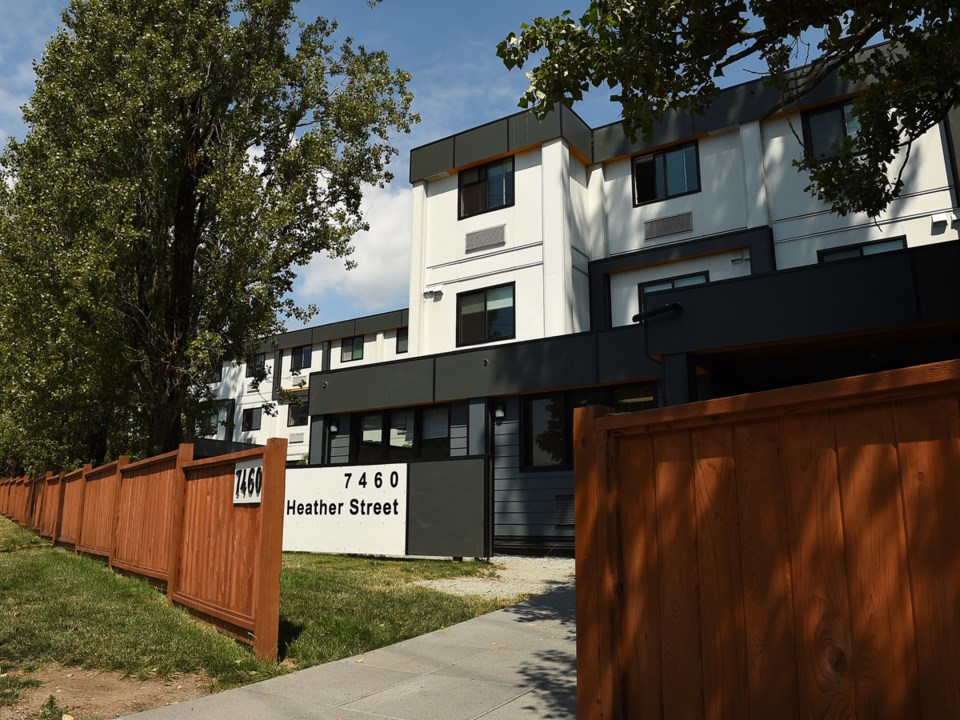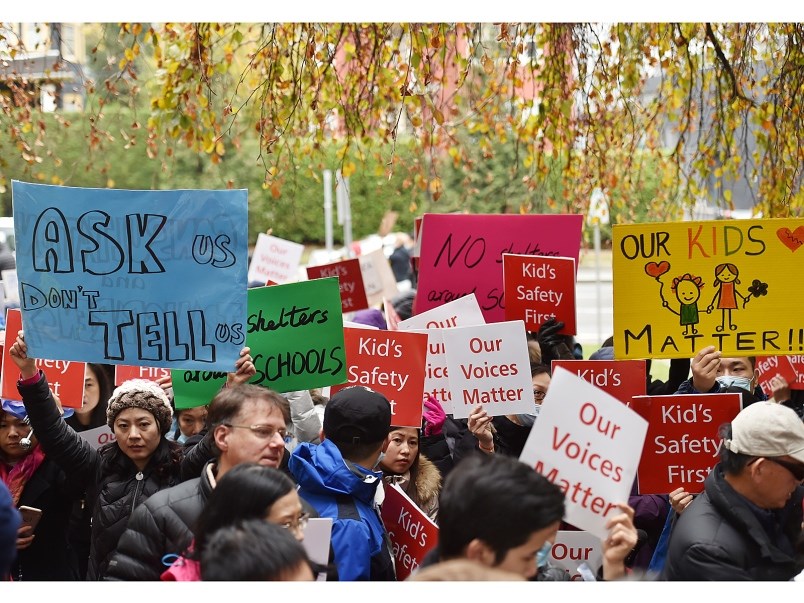The City of Vancouver plans to hire a consultant to gauge whether neighbours of a modular housing complex in Marpole for homeless people have “the same opinion and level of concern” they had when the facility was in the proposal stage in 2017.
The 77-unit Reiderman Residences at 7430 and 7460 Heather St. opened in the spring of 2018, despite earlier protests and unsuccessful court action by a group of residents opposed to the location of the complex because of its proximity to three schools.
A request for proposal document posted June 25 on the city’s website spells out the need for a consultant and scope of work. The city will not reveal a budget for the contract until the bid is closed.
“The city is interested to learn through meaningful, in-depth focused conversations whether perceptions of the projects have changed since operating in the community for over one year,” the document said.
News of the city’s desire to gauge neighbours’ opinions came as a surprise to the executive director of Community Builders, the nonprofit association that has operated the complex since it opened.
Julie Roberts said she is in regular contact with the city’s housing staff and wasn’t aware a consultant was being hired, or the rationale for it until a staff member noticed the posting on the city's website. Roberts said tenants in the two buildings have been welcomed by the community, including those who initially opposed the project.
Roberts pointed to a barbecue last month on the street outside the residences that attracted about 250 people as an indication of the relationship that tenants and staff have with neighbours.
“The feeling was just such a change from the opposition that occurred little more than a year ago,” she said, noting there have been few complaints regarding tenants. “It’s quite a turnaround.”
Roberts said the shift in attitudes toward the complex and its tenants — many of whom were previously homeless or at risk of losing a home — has been most evident from members of a committee set up to monitor and guide the goings-on at the residences.
“About half of them were very strongly opposed,” she said. “And in those meetings [of the committee], it has been a complete reversal. People have referred to the fact that other communities could learn from how well this one was integrated.”
She cited “very, very active communication” between staff and the community as a key to the success of the residences. Tenants, she added, were aware of the pushback from some residents to open the buildings.
“They’ve worked really hard to integrate well, and be aware of their actions when they’re outside the building,” Roberts said.

Over the last year, various media reports and comments from Vancouver city staff, police and politicians suggested the controversy over the project had diminished.
A CTV news report in February said police responded to 33 calls for service to the Marpole complex since it opened in the spring of 2018. Some of the calls were for a missing person, assist the general public and check on the well-being of a person.
Residents opposed to the project told the Courier during the protests and in telephone interviews that they had fears about the type of tenants moving into the neighbourhood and worried crime and drug activity would escalate.
They also said the city didn’t provide enough public consultation and amplified their concerns in a 5,000-name petition delivered to deputy city manager Paul Mochrie during a protest outside city hall in November 2017. The event attracted more than 200 people.
The Caring Citizens of Vancouver Society led the pushback against the modular housing proposal, which was the first one under a provincial government-funded program to provide 606 units at 10 sites across the city.
The Courier left phone and email messages Friday with three members affiliated with the group during the proposal stage, but had not heard back prior to this story being posted Monday.
Simultaneous to opposition from the society were politicians, a church group and many other residents, including students from nearby Sir Winston Churchill secondary school, who publicly supported the project.
Roberts speculated the city’s move to hire a consultant was to get an independent assessment of neighbours’ views to help bolster its case to provide more modular housing in other neighbourhoods.
“If it’s for the greater good and it is done in a really sensitive way, obviously we’re happy to share our experiences,” she said. “If our experiences help other communities, then I support it.”
The city’s communications department said in an email to the Courier that “we hope this information can better inform our engagement process on similar projects, and help us to address stigma surrounding homelessness where we find it.”
The work in Marpole is part of a larger evaluation the city is doing in partnership with B.C. Housing, which is conducting tenant surveys and interviewing operators of the 10 sites.
The city also plans to have staff analyze surveys of residents who live near three other modular housing complexes at 2132 Ash St., 4480 Kaslo St. and 5077 and 5095 Heather St.
“These sites were chosen because they are geographically [near downtown, east side and west side] and economically diverse, and the neighbourhoods were notably active and engaged during the engagement phase of the development permit process,” the city said in the email.
“The evaluation process for the [modular housing] buildings in Marpole will be slightly different than the other three sites, as we did not get a ‘pre-building opening’ survey out to the community before the buildings opened, whereas the other sites we did. We are looking at other possible mechanisms of evaluation for Marpole to be explored through the [request for proposals].”
Mayor Kennedy Stewart has said publicly numerous times that he wants more modular housing in Vancouver and continues to lobby the provincial and federal governments for funding.
The request for proposal document says a consultant will be chosen July 19 and a final report and presentation to city council is due Nov. 29, 2019.
The “target population” for the work includes residents, businesses and their employees, students, faculty, staff and parents at nearby schools, health care residents and staff at the Pearson Dogwood facility and community centre users.
The city’s homeless count conducted in March found that 2,223 people were without a home, with 1,609 in some form of shelter and 614 on the street, living in a vehicle or “couch surfing” — staying on someone’s couch and not paying rent.
@Howellings



